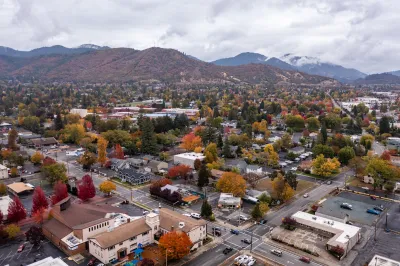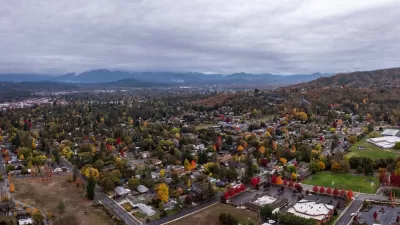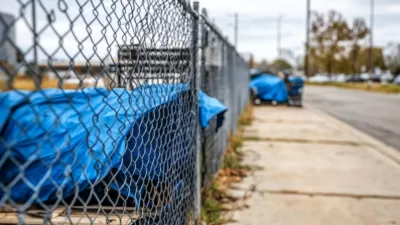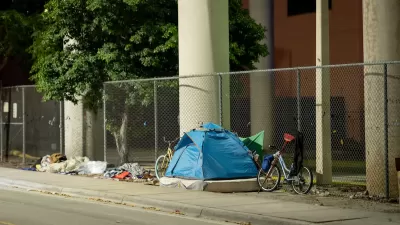The Oregon city will be barred from enforcing two ordinances that prosecute unhoused residents until it increases capacity and accessibility at designated camping sites.

A circuit court judge has barred the city of Grants Pass from enforcing two ordinances targeting unhoused people, reports Jeremiah Hayden in Street Roots.
The city became the focal point of policies addressing homelessness when the U.S. Supreme Court decided that Grants Pass could enforce criminalization ordinances despite not having enough shelter space to house everyone living on the street in the case of Grants Pass v. Johnson.
Now, an injunction issued by Josephine County Circuit Court Judge Sarah McGlaughlin requires the city to increase the capacity of its designated shelter or camping sites and provide accessibility at those sites.
According to Hayden, “Judge McGlaughlin ruled that with the exception of two parks — Riverside Park and Reinhardt Volunteer Park — the city cannot cite, arrest, detain, issue fines, or otherwise prosecute any person for camping on public property, nor can the city sweep residents from public spaces.” The ruling extends a temporary restraining order issued in February.
Although the U.S. Supreme Court ruled in favor of the city, Hayden explains that Oregon law “still prohibits cities from penalizing homeless residents when the number of shelter beds are insufficient.” The 2021 Oregon law also calls on cities regulating homelessness to consider “the impact of the law on persons experiencing homelessness.”
The article details the positions of local lawmakers, some of whom want to take a more punitive approach.
FULL STORY: Judge bars Grants Pass from enforcing anti-homeless ordinances while lawsuit continues

Maui's Vacation Rental Debate Turns Ugly
Verbal attacks, misinformation campaigns and fistfights plague a high-stakes debate to convert thousands of vacation rentals into long-term housing.

Planetizen Federal Action Tracker
A weekly monitor of how Trump’s orders and actions are impacting planners and planning in America.

In Urban Planning, AI Prompting Could be the New Design Thinking
Creativity has long been key to great urban design. What if we see AI as our new creative partner?

Pedestrian Deaths Drop, Remain Twice as High as in 2009
Fatalities declined by 4 percent in 2024, but the U.S. is still nowhere close to ‘Vision Zero.’

King County Supportive Housing Program Offers Hope for Unhoused Residents
The county is taking a ‘Housing First’ approach that prioritizes getting people into housing, then offering wraparound supportive services.

Researchers Use AI to Get Clearer Picture of US Housing
Analysts are using artificial intelligence to supercharge their research by allowing them to comb through data faster. Though these AI tools can be error prone, they save time and housing researchers are optimistic about the future.
Urban Design for Planners 1: Software Tools
This six-course series explores essential urban design concepts using open source software and equips planners with the tools they need to participate fully in the urban design process.
Planning for Universal Design
Learn the tools for implementing Universal Design in planning regulations.
planning NEXT
Appalachian Highlands Housing Partners
Mpact (founded as Rail~Volution)
City of Camden Redevelopment Agency
City of Astoria
City of Portland
City of Laramie





























